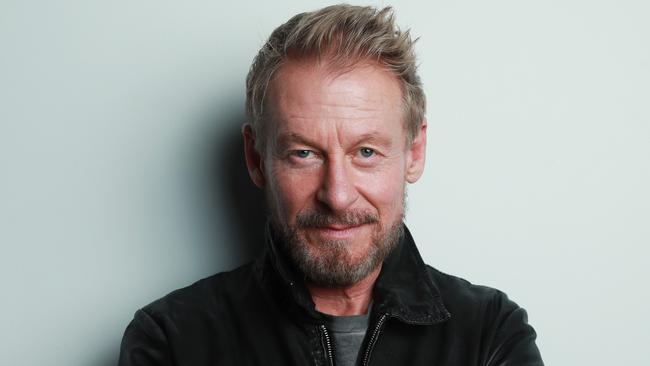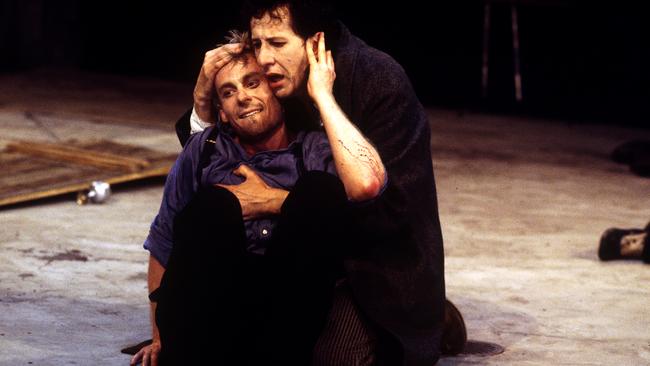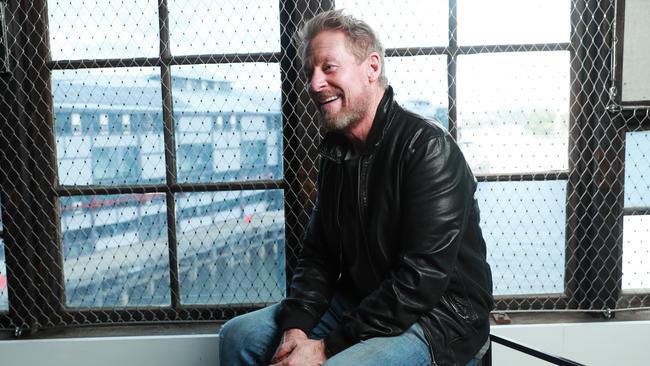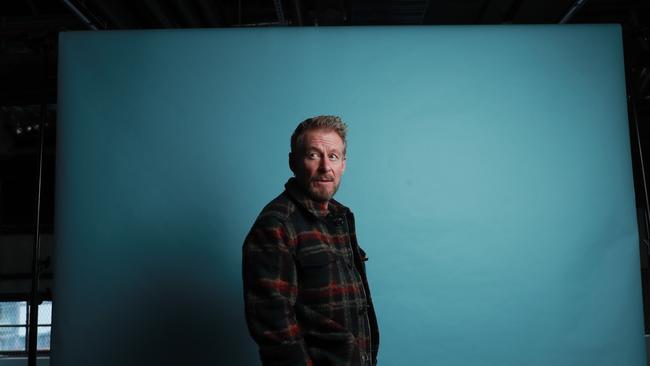Why Roxburgh has come back to the Bard
He was legendary as Hamlet, but it’s taken 28 years for Richard Roxburgh to return to Shakespeare’s magic. Here, he reveals the toll it takes.

Some performances you want to capture forever and, like a magician, conjure them to life at will. Many people will remember the remarkable Hamlet at Belvoir St Theatre, Sydney in 1994. Richard Roxburgh was the Dane, and Geoffrey Rush his friend Horatio. Jacqueline McKenzie and then Cate Blanchett were Ophelia. The overwhelming memory, from Neil Armfield’s production, is of Roxburgh and the nobility of youth, death-haunted and oppressed by the rotten state of Denmark. To borrow a line from another Shakespeare play, you’d cry to dream again, to see that Hamlet.
For Roxburgh, who took the stage as Hamlet 100 times, the play is etched in the memory for other reasons.
He’d come down with an attack of shingles during the season. Then, on opening night of the Adelaide run, he fell and tore his anterior cruciate ligament while trying to stab Polonius behind the arras. Roxburgh needed surgery and the rest of the season was cancelled.
And Hamlet is emotionally expensive, Roxburgh says. He’d lost his mother only a few years earlier, and playing Hamlet every night was like opening the wound of grief.
This may explain why Roxburgh, such an exciting and charismatic actor, has not done Shakespeare since. Chekhov, yes, in Uncle Vanya and Platonov (renamed as The Present). He’s done Waiting for Godot with Hugo Weaving, and had a terrific turn as Cyrano de Bergerac. But no Shakespeare.
He’s waited until he turned 60 – his birthday was in January – before taking on the Bard again. This month, he returns to Sydney Theatre Company in The Tempest as Prospero, the scheming wizard and occupant of an enchanted island where he magics a storm and manipulates his enemies to his design.

When Roxburgh emerges from a rehearsal room at the Wharf Theatre, he has the air of Prospero about him – he’s wearing a navy duffel coat and a short beard flecked with grey, his eyes level at the horizon. The very image of the ancient mariner, I tell him, but quickly retract the ancient. The features are a little life-worn, but far from decrepit.
“We realised that the last time I’d done Shakespeare was Hamlet which was really strange,” he says. “To be honest, there’s nothing I wanted to do. I just didn’t feel like I wanted to do Macbeth or Richard III or Henry. I just felt it wouldn’t be the kind of Kilimanjaro that Hamlet was.
“That’s just daft, because it’s … Shakespeare.” He says the name expansively, as if to fill a stage.
“There are always challenges, it’s always beautiful.”
Indeed, the Bard seems to have been nudging Roxburgh, however reluctantly, in his direction. There was a tantalising rumour a few years ago that Roxburgh and Blanchett were planning an onstage reunion as Antony and Cleopatra, in the most gorgeous of Shakespeare’s Roman plays. Is that true?
“Hmm,” Roxburgh considers. “I’m sure we talked about it. We were thumbing through the cards of what the possibilities are. I got a text when she found out I was doing (The Tempest), and said something like, ‘Are you attempting to do a play without me?’ I guess we’re always on the lookout for things. I’m sure that was an idea at some point. I don’t know if it still would be.”
Another nudge: David Wenham, who played Laertes in that celebrated Hamlet, recalls that the tour was done as a kind of double-bill, with a second Shakespeare play performed by the same cast – except for Roxburgh, who had those nights off. That play was The Tempest.
“There was a little bit of magic in the air at Belvoir St at the time,” Wenham says. “It was an absolute gift to have been involved in it.”
And even Roxburgh’s alter-ego, the dissolute Sydney barrister Cleaver Greene, has a brush with Shakespeare, in season two of Rake. Cleaver snores through a performance of The Tempest and declares it to be the worst performance of Shakespeare in recorded history.
“The Tempest is Shakespeare’s final great testament to life and imagination,” Cleaver tells the director. “And instead of setting it on an Aegean island you’ve popped it into a laundromat in Potts Point.”
Roxburgh’s been exceptionally busy in the lead-up to his return to the stage. He’s been Bob Hawke on Netflix’s The Crown, and Vernon Presley, Elvis’s spineless dad in the Baz Luhrmann biopic. There were parts in two series about traumatic episodes in recent Australian history: Fires, about the Black Summer of 2019-20, and Bali 2002, about the terror attack and its aftermath.

He’d pulled out of the much-vaunted screen adaptation of Shantaram, after having shot two episodes. A change of showrunner and then the pandemic disrupted the shoot, and when it moved to Thailand it was more than Roxburgh could bear. “I couldn’t fathom how dreadful that would have been,” he says. “It was shooting in Thailand for five months in a really strict bubble lockdown. Last year in the Covid madness, I wasn’t prepared to leave my family.”
And why would he? Roxburgh lives with his glamorous Italian wife, Silvia Colloca – a triple threat of actor, chef and mezzosoprano with a recent No. 1 album – and their three children. They make their home in one of Sydney’s most picturesque spots on the Northern Beaches, in an old 1970s house that Roxburgh says leaks like a submarine.
Being near the coast and a prized surf beach, Roxburgh regrets not being able to surf. There wasn’t much opportunity when he was growing up in Albury in country NSW, the youngest of six.
“I’ve never acquired the skill, but I’m really desperate for my kids to learn,” he says. “It’s just a beautiful thing, and kind of a waste not to, up there.”
Roxburgh tucks into his lunch as he reflects on the changes he’s seen in the acting profession since he started out more than 35 years ago. He’d already earned an economics degree from the Australian National University when he decided to switch to acting and successfully auditioned for a place at the National Institute of Dramatic Art in Sydney.
NIDA taught him a few things and smoothed some rough edges. “Just the study of your voice and movement,” he says. “So great, because I walked like a chimp and my voice used to be pitched in this really weird place. Unpicking all of that was very useful. And to work with the great industry professionals.”
In other ways, NIDA was less edifying. The famous school had produced graduates such as Judy Davis and Mel Gibson, but Roxburgh says that by the mid-1980s, it had become resistant to change, and students felt they had no voice.
“Our year was very involved in trying to change the culture that existed there – it was very old-school thinking which was very entrenched,” he says. “There were no checks and balances, to our mind, including no student representative council. So we tried to change, and we got our fingers burnt. It was seen as a highly provocative act.”

He recalls that vulnerable students were flailing and not being supported. Actor training involves a certain amount of personal exposure: breaking through habits of speech and movement, drawing on the well of emotion and experience, digging into the psyche. Improvisation classes, he says, could become “extraordinarily personal, with no kind of psychological or mental health safety nets for anybody in those days”.
“There were some very hurt and troubled people,” he says. “I would say the majority of my year quit acting the day that NIDA ended …
“I feel lucky, I’m resilient. I felt I was one of the lucky ones, because I could get through it. But I remember gut-churning stomach acid for weeks on end, where you just thought this could go in any number of directions.”
Most people working in theatre or on a film shoot, Roxburgh says, have an implicit understanding about personal responsibility and other people’s boundaries. It’s why he bridled a bit at posters put up about inappropriate behaviour – a necessary corrective in the wake of MeToo, perhaps, but in Roxburgh’s view a bit over the top.
“When MeToo happened, I wasn’t doing much theatre,” he says. “You would notice a sign in the make-up van, talking about sexual conduct. It made me so depressed. I just thought, ‘holy crap, are we really here as a civilisation that we have to have posters in a make-up van?’”
It seems that MeToo has done its work: that the message has got through and people are more mindful and respectful of others.
“I’m sure they are,” Roxburgh continues. “By the same token, a rehearsal room, or a writers’ room … have to be places where you can’t be constantly second-guessing – ‘Is this OK?’
“What you hope is that there’s an essential, bottom-line human contract between the individuals in that room, whereby things are understood. If they’re not, that’s a problem. To my mind, it’s human decency. I realise that’s not a very codified way of thinking, but I don’t know how else to put it.”
Roxburgh is actorly in the best possible way. His features are mobile and interesting, the voice granular and expressive, but not in an exaggerated, histrionic way. He’s more thoughtful than show-off, letting his eyes drift to the middle distance when he’s forming an idea.
And he clearly loves the power of language and a well-crafted drama, whether Cleaver’s piquant turns of phrase in Rake, or the incantatory speeches of Prospero. For his return to the stage he’s been busy learning Shakespeare’s lines, “getting all these massive screeds of information into my old hard drive”, as he puts it. Fragments of The Tempest emerge between mouthfuls of chicken and noodle salad … “Our revels now are ended”, he begins, in the speech about this insubstantial pageant, the stuff that dreams are made on.
Prospero is an unusual character in Shakespeare’s dramas, being both the protagonist in the action and, in a metatheatrical sense, the author of its dramaturgy. Formerly Duke of Milan, he abrogated the responsibilities of governorship for a life of books and magic. He is usurped by his brother Antonio, and flees with his baby daughter Miranda to a supposedly deserted island. When Antonio’s ship comes close to the island Prospero conjures a storm, bringing Antonio and the King of Naples and his court into his magic orbit to make mischief with them.
Roxburgh sees an interesting contrast between his last Shakespeare role in Hamlet and Prospero in The Tempest. Hamlet, he says, is a young man driven to make choices, or not, that will determine the rest of his life. The Tempest is more retrospective, as Prospero reviews his life with some resignation and resolve.
Of Prospero’s dilemma Roxburgh says: “‘Here I am on a deserted island, all my enemies are here, and I have this power. Now, how do I react?’ It’s looking backwards through life with a completely different lens, whereas Hamlet is trying to look forward and failing … There’s an interesting line of tension between the two characters that makes sense, in a way, to go from one to the other.”
Kip Williams, who is directing The Tempest, has worked with Roxburgh only once before, when he was the assistant director to Andrew Upton for Cyrano de Bergerac in 2014. Not yet 40, the artistic director of Sydney Theatre Company was possibly too young to have seen Roxburgh’s Hamlet but he knows the performance by reputation.
“I feel like I’ve seen it, because so many people have talked to me about it so vividly over the years,” Williams says.
“But I have seen Richard be extraordinary in Beckett, in Chekhov, and have been itching to work with him. We’ve been talking about The Tempest for about four years on and off.
“He is one of the great Shakespearean actors on the planet and his Hamlet lives on in theatrical legend,” he adds. “I’d work with Richard reading out the phone book.”
Williams has assembled a large cast and a crack creative team. The Tempest is a play alive to the natural world – it opens with a “tempestuous noise of thunder and lightning” – and to its spirits.
There is music by Stefan Gregory and an “exquisite” stage design by Jacob Nash. Williams says his production is a reflection on permanence and impermanence, the “letting go” of human affairs and the natural world that endures.
“It’s a dense, rich piece, filled with thematics and ideas, but with this beautiful core philosophy about the importance of letting go – both of what we control and what we don’t control,” he says. “Both Rox and I were very compelled by that narrative, particularly in the context of the years we’ve just lived through.”
The play is set on an “uninhabited island”, but it is not some terra nullius. It is home to strange but intelligent beings: the air-spirit Ariel, and the half-human creature Caliban. Roxburgh says any contemporary production of The Tempest has to address or unpack the island’s colonisation by Europeans.
“In an Australian production of this play, I don’t see how you couldn’t,” he says.
“I love what we’ve managed to do with this particular production – I think it will ring a bell for an Australian contemporary audience.”
The Tempest was likely first performed in 1611 and published in the First Folio compendium of Shakespeare’s plays put together by John Heminges and Henry Condell in 1623. Because it appears first in the table of contents – under “Comedies” – The Tempest was for a long time thought to be among Shakespeare’s earliest works. Only later was it identified as being a late work, if not quite the last that Shakespeare wrote.
Sydney Theatre Company’s production of The Tempest comes at the end of the 2022 season, not in the quadricentenary of the First Folio next year. Still, the wisdom that Prospero arrives at seems a fitting way to acknowledge the historic moment. Prospero relinquishes his magic power over others, as he accepts again the temporal responsibilities of government. “So much of The Tempest is about divesting, the stripping away of everything – it’s what I love most about it,” Roxburgh says.
“There’s some conjecture about it, but for the most part, people have settled on the idea that this is (Shakespeare’s) last work. And no matter what, it has that sense of valediction about it, of shedding everything – ‘I am releasing all’.”
Roxburgh’s return to the stage and especially as Shakespeare’s great magician promises to be a treat for theatre-lovers. Who knows, even Cleaver Greene may find something to enjoy.
The Tempest is at the Roslyn Packer Theatre, Sydney, until December 17.

To join the conversation, please log in. Don't have an account? Register
Join the conversation, you are commenting as Logout